

World politics explainer: The Great War (WWI) This is the first in a series of explainers on key moments in the past 100 years of world political history.
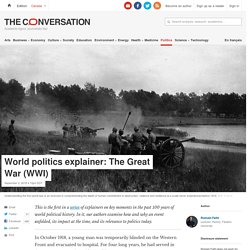
In it, our authors examine how and why an event unfolded, its impact at the time, and its relevance to politics today. In October 1918, a young man was temporarily blinded on the Western Front and evacuated to hospital. For four long years, he had served in the German Army alongside 11 million men. Whether his blindness came from a gas attack or a sudden bout of nerves is still being debated. But it is clear that, like hundreds of millions of people at the time, his wartime experience shaped the rest of his life. This was during the first world war – the foundational event of the violent 20th century – and that young man was Adolf Hitler.
What happened? Sparked in the Balkans as a result of European nationalism and imperial rivalries, the first world war raged from July 1914 to November 1918. Obituary-bill-orme-a-lawyer-with-a-thirst-for-justice-20160502-gok5q0. Step by step. He was making tea when he died.
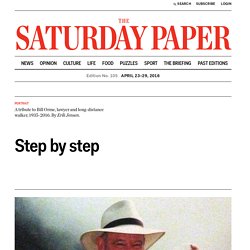
Nan was still in bed and while the kettle boiled he would have squeezed her a glass of grapefruit juice. He did this every morning. The slate tiles would have been cold where he was standing and I doubt he was wearing a shirt. Choose your priorities and ruthlessly eliminate the rest. Recently, I stood in my closet deciding whether an old gym T-shirt brings me joy.

I was following the advice of organization expert Marie Kondo, whose bestselling book “The Life-Changing Magic of Tidying Up,” has swept the world. According to Kondo, we can tidy up our homes, and our lives, by deciding whether each of our possessions sparks joy — and getting rid of anything that doesn’t. In a world that seems determined to make us consumers, there’s a contrasting wave of minimalism — people desperately want to cut the non-essential. Freed of excess clutter, people find joy, inspiration and, of course, their stuff. There in a crisis. She knows what you want to ask, what you’re trying to find a polite way of asking.
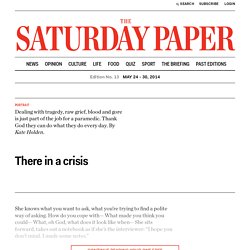
How do you cope with— What made you think you could— What, oh God, what does it look like when— She sits forward, takes out a notebook as if she’s the interviewer: “I hope you don’t mind. I made some notes.” Strong New Zealand voice, straight blonde hair, blue eyes that fix you like bolts. It Can Happen Here. They Thought They Were Free: The Germans, 1933–45 by Milton Mayer, with a new afterword by Richard J.
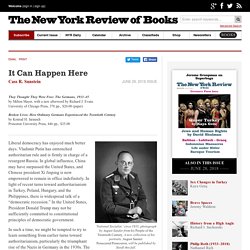
Evans University of Chicago Press, 378 pp., $20.00 (paper) Broken Lives: How Ordinary Germans Experienced the Twentieth Century by Konrad H. On the Internet, what comes after post-Modernism? The Internet recently celebrated its 40th anniversary -- although to many of us in the social media world it feels like the Internet was just born yesterday.
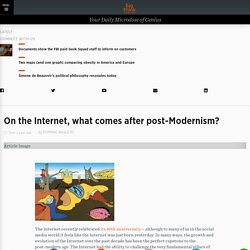
In many ways, the growth and evolution of the Internet over the past decade has been the perfect capstone to the post-modern age. The Internet had the ability to challenge the very fundamental pillars of society, upend entire industries, and make cultural production (via social media) available to just about everyone. For the past five years, search has been the dominant paradigm - the search for knowledge, the search for connections, and the search for meaning. The Road to Wigan Pier (Penguin Modern Classics): Amazon.co.uk: George Orwell, Peter Davison, Richard Hoggart: 9780141185293: Books. This is a vivid and affecting account of the bleak lives of the working class in the industrial north of England.

The first half is a set of essays, the first one is on life in a tripe shop come boarding house and is an object lesson in how to write, as is the superb account of working in a coal mine. By modern standards the structure is probably rather shambolic, and it is stronger on personal experience than evidence, but as a writer, Orwell has the ability to just vanish and let the lives of those he is describing come fully alive before you.
The second half was not originally published, and it is easy to see why. Don't forget first principles in rushing to #MeToo. "Castrate him!
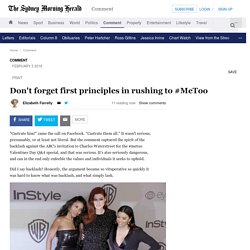
" came the call on Facebook. "Castrate them all. " It wasn't serious, presumably, or at least not literal. The female price of male pleasure. Sign Up for Our free email newsletters The world is disturbingly comfortable with the fact that women sometimes leave a sexual encounter in tears.
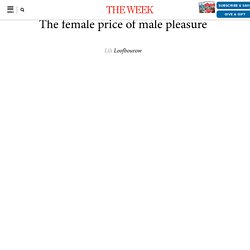
When Babe.net published a pseudonymous woman's account of a difficult encounter with Aziz Ansari that made her cry, the internet exploded with "takes" arguing that the #MeToo movement had finally gone too far. "Grace," the 23-year-old woman, was not an employee of Ansari's, meaning there were no workplace dynamics. Her repeated objections and pleas that they "slow down" were all well and good, but they did not square with the fact that she eventually gave Ansari oral sex. Why didn't she just get out of there as soon as she felt uncomfortable? It's a rich question, and there are plenty of possible answers. The female price of male pleasure. What our leaders say about Australia Day – and where did it start, anyway? Opposition to Australia Day, and the push to change the date to one that attempts to reconcile with the dispossession and death of Aboriginal and Torres Strait Islander people, is not a recent invention.
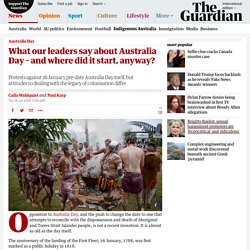
It is almost as old as the day itself. Australian Institute of Aboriginal and ... On January 26 1938, Sydney awoke to a warm, sunny day. A series of events and activities had been organised to mark the sesquicentenary anniversary. For those who celebrated there was a parade, a sailing regatta and a lawn bowls tournament. One of the feature events of the day was a re-enactment of the arrival of the First Fleet. A group of Aboriginal men from Menindee, in far-west New South Wales, were brought to Sydney to act in the role of the original Eora peoples of Port Jackson. Those who mourned and had little reason to celebrate were kept waiting until the parade passed by.
Nocookies. You have cookies turned off To use this website, cookies must be enabled in your browser. To enable cookies, follow the instructions for your browser below. Facebook App: Open links in External Browser. Shelja Sen: How to talk (and listen) to your children. The joy and relief of saying no: how I learned to stop worrying and turn peop... Throughout my life, I have revelled in saying yes. I should qualify that straight away by saying that, for the first half of my life, the only offers I got were social; saying yes to those was a joy.
Doors were opened and my mind was stretched and then blown. I was lucky enough at the time to have a place to live and the means to put food on the table, so, no matter what went wrong, nothing could really hurt me. The inconvenient truth about love. Hannah K. 10 Ways to Love Better. 22 Habits of Unhappy People. Comments. The insults of age. The insults of age had been piling up for so long that I was almost numb to them. The husband (when I still had one): “You’re not going out in that sleeveless top?”
The grandchild: “Nanna, why are your teeth grey?” The pretty young publisher tottering along in her stilettos: “Are you right on these stairs, Helen?” The flight attendant at the boarding gate: “And when you do reach your seat, madam, remember to stow that little backpack riiiight under the seat in front of you!” The grinning red-faced bloke who mutters to the young man taking the seat beside me: “Bad luck, mate.” Charlotte Wood: We’re told female anger is finding its moment. But I can’t tr... At a bookshop event one evening, a tall, well-dressed woman in her 70s hovered at my signing table for a long time.
The discussion had been about my novel The Natural Way of Things, which concerns the punishment of young women who speak out about sexual mistreatment. Charlotte Wood: We’re told female anger is finding its moment. But I can’t tr... My Year of No Shopping. A Love Affair With Bookstores. Going in Beauty: An Interview with Tony Hillerman. THE MYSTERY NOVELS of Tony Hillerman (1925–2008) focus on culture and landscape. Going in Beauty: An Interview with Tony Hillerman. Learning to stop tormenting ourselves is an art we can all master. Stop meditating, instructs Fabrice Midal. In fact, don't just stop it, f--k meditating. While you're at it, f--k trying to be calm, f--k obeying, f--k being wise. It's unusual advice coming from a professor of philosophy at the University of Paris who has practiced meditation for 25 years and taught it for 15 years.
The Nationalist's Delusion. When you look at Trump’s strength among white Americans of all income categories, but his weakness among Americans struggling with poverty, the story of Trump looks less like a story of working-class revolt than a story of white backlash. And the stories of struggling white Trump supporters look less like the whole truth than a convenient narrative—one that obscures the racist nature of that backlash, instead casting it as a rebellion against an unfeeling establishment that somehow includes working-class and poor people who happen not to be white.
The nature of racism in America means that when the rich exploit everyone else, there is always an easier and more vulnerable target to punish. The Irish immigrants who in 1863 ignited a pogrom against black Americans in New York City to protest the draft resented a policy that offered the rich the chance to buy their way out; their response was nevertheless to purge black people from the city for a generation. How to Explain Mansplaining. Neil Gaiman: Why our future depends on libraries, reading and daydreaming.
The strange death of Europe. By Marilynne Robinson. Why Richard Thaler Deserved the Nobel in Economics - The Atlantic. A Life in Books - Toast Magazine. Jo Newton - What a courageous young woman. People Who Are Emotionally Intelligent Have These 5 Special Qualities. Alex Steblowsky - This 92-year-old, petite, well-poised... Why we should all stop saying “I know exactly how you feel” – ideas.ted.com. Willow Saige -
Hillary Clinton, the First Woman to Win a Major-Party Presidential Nomination... Hillary Clinton will release her election memoir, What Happened, tomorrow, and as is the case with pretty much everything she’s ever done, some people—including those in her own party—are pissed about it. Democrats are “dreading” Clinton’s book tour, according to Politico, with one Democratic representative saying the attention around What Happened is being met with a “collective groan.” Chat10looks3 copy_public.xlsx. Clementine Ford: Why most grand romantic gestures are anything but romantic. Big house or a big super balance?
Disappointed to read this. My youngest is super keen to join Teach 4 Aust.☹️ How a Messed up Childhood Affects You in Adulthood. Love this interview with Bruce Pascoe... - The Indigenous Literacy Foundation. Open Culture - Ailing Christopher Hitchens Creates a List... Tips to Declutter and Clean up Your Home. Nobody wants the family heirlooms anymore. How many books could you read in the time you spend on your phone? (infographic) How We Got to Here: A Charlottesville Reading List. Sam Shepard in Love, on Love.